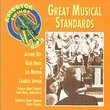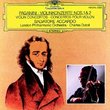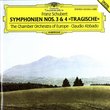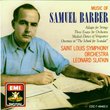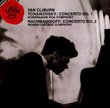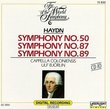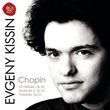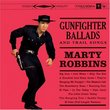| All Artists: Johann Sebastian Bach, Karl Richter Title: Toccata and Fugue: Bach Organ Music Members Wishing: 0 Total Copies: 0 Label: Deutsche Grammophon Release Date: 10/25/1990 Genre: Classical Styles: Historical Periods, Baroque (c.1600-1750), Instruments, Keyboard Number of Discs: 1 SwapaCD Credits: 1 UPC: 028941544223 |
Search - Johann Sebastian Bach, Karl Richter :: Toccata and Fugue: Bach Organ Music
 | Johann Sebastian Bach, Karl Richter Toccata and Fugue: Bach Organ Music Genre: Classical
|
Larger Image |
CD DetailsSimilar CDsSimilarly Requested CDs
|
CD ReviewsFaithful Rendition of Baroque Patrick Walsh | Rochester, NY United States | 10/13/2003 (5 out of 5 stars) "The great tragedy of Baroque music is that we no longer really know how it was actually played. Various attempts to reconstruct the Baroque flavor of the music have been made. Karl Richter, and Wanda Landowska are perhaps the pre-eminent interpreters of Baroque music in the 20th century.Within this album, Karl Richter's breaks away from his contemporaries, playing on the massive organs for which Johann Sebastion Bach wrote these pieces, instead of the small portable organs. He does not try to play the pieces fast or slow, but rather play the piece at a pace in which each note has meaning. A great deal of thought and consideration has gone into each performance, and they display a profound understanding of the music Bach was trying to create.I do not want to discount the modern performances of Bach's music, many of which are top notch--for example Glen Gould's rendition of the Well-Tempered Clavier, but they do not fully reveal the mastery of harmony that Bach displays in each and every piece on this album. Modern renditions display Bach's genius in creating music that can be played on many different instruments, but they do not display Bach's vision for the specific piece.This is as close as you can come to listening to Bach's music the way he created it in his mind before setting pen to paper." Much much more than just the Toccata & Fuge in d minor Craig Matteson | Ann Arbor, MI | 07/13/2002 (5 out of 5 stars) "I too bought the vinyl version of this disk in my youth in the late '60s (actually it was about half this disk, right?). Itis such a wonderful recording because it plays the very dramatic and popular toccata and fugue in d minor as a serious and intelligent piece on a magnificent instrument - not as some kind of madman's nightmare. Yes, there is drama and fire, but it is all there with purpose and intellect.But there is SO MUCH MORE on this disk. Wonderful recordings of trio sonatas, fantasies, and chorale preludes. This is such a wonderful disk I really believe you would be very happy to own it and listen to it again and again. The ONLY negative is that the liner notes are not included (or weren't on the disk I have). Please email me with what you think of this disk once you hear it, particularly all the other selections." The original wall of sound Jakeymon | San Francisco, CA United States | 11/02/2004 (5 out of 5 stars) "I just picked this up again after having lost it some years ago. I'd like to second everything mentioned in the reviews below. These are very rich, dense, wonderful pieces and the performances on each of them are - at least as far as a non-classical person like me can tell - flawless.
The first two tracks are, incidentally, pretty fine examples of what would come to be known as the wall of sound some two hundred years later. And they're really considerably better than most of what Phil Spector came up with." |

 Track Listings (8) - Disc #1
Track Listings (8) - Disc #1